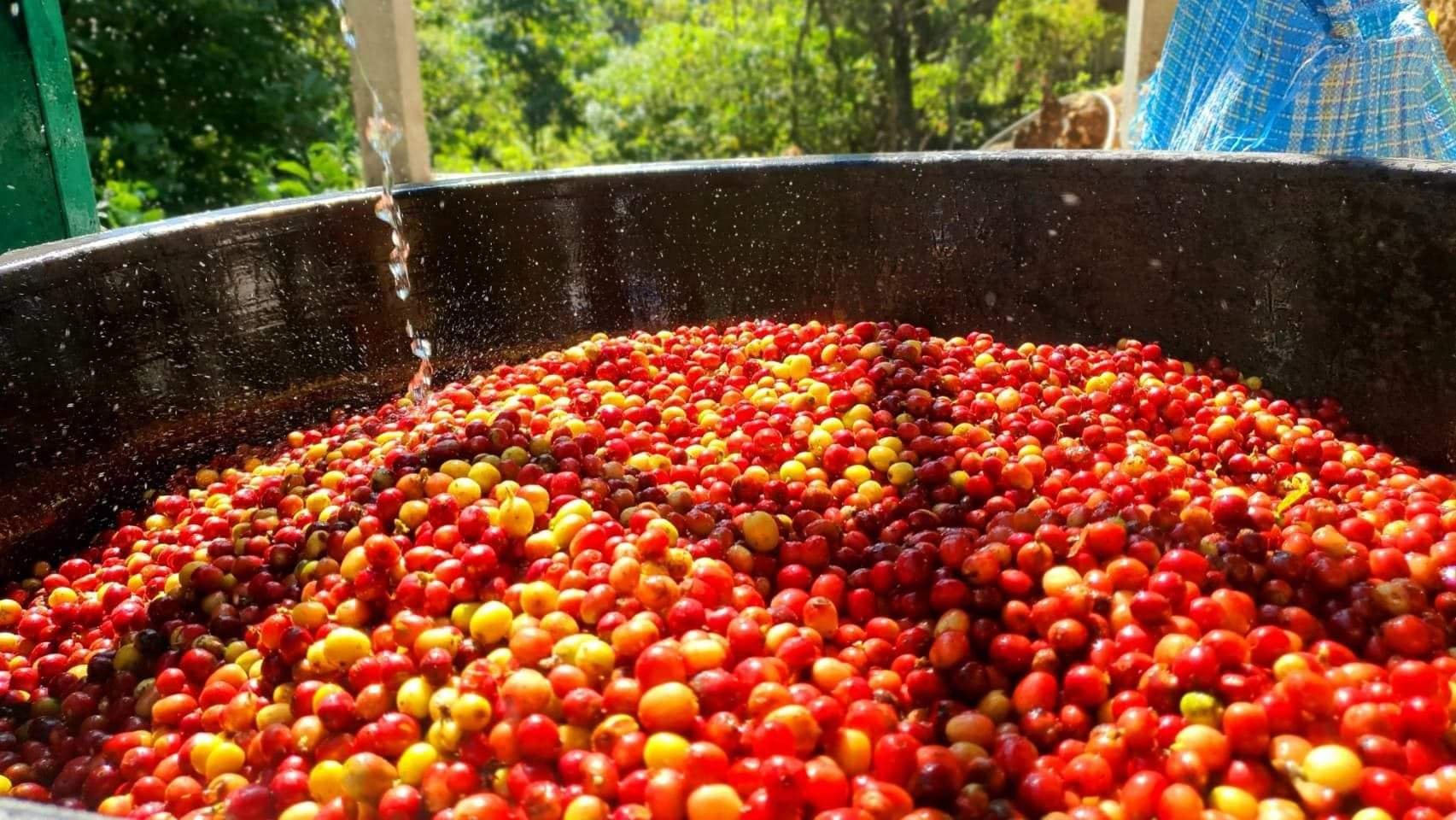Filtering Tradition and Innovation: Mae Chedi’s Coffee Evolution
Watchara Yawirach, 36, leads a coffee cooperative in Mae Chedi, Chiang Rai, which consists of 19 members. Traditionally known for its tea plantations, where tea is the main cash crop, Mae Chedi has also incorporated coffee into its farmers’ livelihoods, though to a lesser degree. Coffee cultivation was introduced in 1977 as part of efforts to replace opium production in Thailand.
With the recent rise in demand for specialty coffee, the younger generation of farmers in Mae Chedi has begun to take coffee production more seriously. This marks the cooperative’s third year producing specialty coffee and its first year exporting. The cooperative consists of skilled farmers who borrow tea fermentation techniques and adapt them for coffee production. Beanspire also collaborates with the cooperative to experiment with innovative methods, making this coffee one of the finest naturally processed coffees from Thailand this season.
CULTIVARS
Chiang Mai
ALTITUDE
1250 MASL
NOTABLE
The Chiang Mai varietal is a local hybrid developed by crossing SL28, Caturra, and Híbrido de Timor. As a catimor variant, it is similar to Colombia and Castillo varietals but has been backcrossed with SL28 to improve cup quality. This rust-resistant cultivar was developed as part of the late King’s initiative to eradicate opium plantations among Northern Thailand’s hill tribes.
PROCESSING
Anaerobic Natural : The coffee cherries were fermented for 9 days in sealed HDPE bags, creating a near-zero oxygen environment. This anaerobic fermentation process encourages the production of lactic acid, which enhances the body, wine-like characteristics, sweetness, and complexity of the coffee. The process is inspired by the area’s traditional tea fermentation methods, which also involve long fermentation periods. After fermentation, the cherries were dried on raised beds to achieve the desired moisture level. The green coffee underwent thorough preparation, passing through a destoner, huller, size grader, and density table multiple times, followed by meticulous hand-sorting. To ensure freshness during shipping, the coffee was packed in triple-layered bags: an outer cotton bag, a middle layer of High-Density Polyethylene (HDPE), and an innermost GrainPro bag.
Anaerobic Red Honey : The coffee cherries are fermented for nine days in sealed HDPE bags before being pulped and dried on raised beds. This creates a near-oxygen-free environment, allowing for the production of lactic acid during the anaerobic fermentation process. This imparts body, wine-like acidity, sweetness, and complexity to the coffee. The process is reminiscent of the area’s traditional tea fermentation methods, which involve long fermentation periods.For green coffee preparation, the beans are processed using a destoner, huller, size grader, and density table, with multiple passes through the density table, followed by hand-sorting. The coffee is shipped in triple-layered packaging: an outer cotton layer, a middle HDPE layer, and an inner GrainPro layer, ensuring excellent protection and preservation during transport.
Cupping notes
2024 HARVEST
Beanspire - Mae Chedi - anaerobic red honey
Beanspire - Mae Chedi anaerobic natural
-
The price you pay for Watchara Yawirach farrmer group lot (p/kg). We agreed on this price directly with the farmers, disregarding the volatile US Coffee C price.
-
The farm gate price includes the payment to farmers for the coffee, wet milling, and margin.
Mae Chedi Anaerobic Natural :€ 10,71
-
Beanspire collaborates with producers to mill their coffee, coordinate local freight from farm to port, and manage export paperwork, marketing and sales. The price break down also includes the cost of these services along with Beanspire's profit margin.
Mae Chedi Anaerobic Natural :€ 2,30
-
Shipping is arranged from Lat Krabang Inland Container Depot in Thailand to Rotterdam, Netherlands, with all logistics and paperwork managed by Beanspire.
-
Average financing cost owed to (mostly social) lenders. This ensures immediate payment to the farmers when the coffee leaves the farm or port.
-
A standard TSU premium on all coffees designated exclusively to accelerate farmers’ own regenerative agriculture projects. Read more about the regenerative projects done by Rushashi here. (Webpage Coming soon)
-
This Side Up compensation for spending time and resources importing this coffee. Our work includes year-round contact with producers, managing export, shipping, import, warehousing, grading, sampling, finding and keeping roasting partners for Watchara Yawirach . € 1,65 is This Side Up’s Model 1 markup. For a full overview of our modular margin construction, see the Trade Models page.
PHOTO GALLERY
You may use them freely to promote Watchara Yawirach among your customers.



























